
Can you use a metal detector on the beach? You certainly can - many metal detectorists start their hobby by metal detecting on their local beaches. There are a number of things you will need to check before you grab your detector and head off, but beaches are fantastic places to detect metal.
As beaches are so busy even in the British summer, it also means that many people lose items during their visit. This is particularly true at beaches in seaside resort areas, and it also means you may be able to find items from way back in Victorian times when beach holidays first became popular.
If you are looking to start your metal detecting journey at your local beach, you might have some questions about where to begin. Our experts have put together their advice for making the most out of your local beach.
If you are just starting out, you might have questions about what you can and can’t do with your metal detector. Are you allowed on the beach? Maybe you’re looking for a metal detector that can work on wet and dry sand? Or perhaps you are wondering what you should wear? Read on to discover why you should plan your next metal detecting adventure on the beach, and watch our beach detecting guide video to find out more.
Contents
Can I use my metal detector on the beach?
Before you start planning your trip to the beach, there are a number of factors you will need to consider. You may have heard people say that you can metal detect at any beach in the UK, but that is simply not true. As a metal detecting community we advise you to check a number of things before you head off.
The Crown Estate
The Crown Estate manages land across the UK including many public beaches. Those wanting to carry out metal detecting on the ‘Crown Estate foreshore’ (defined as the land between high water and low water) are allowed to do so, but they advise obtaining a permit first which can be applied for simply and easily on their website.
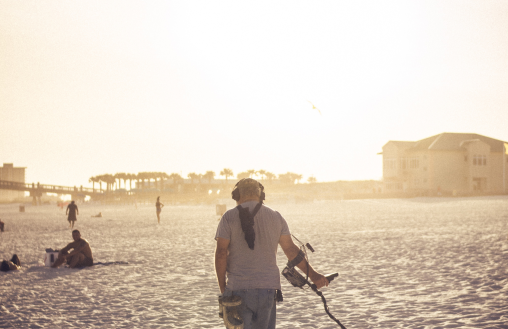
National Trust
The National Trust looks after much of the UK’s coastline, including many beaches open to the public. However, the Trust does not allow metal detecting on its land unless it is part of a clearly defined archeological project. If you are looking to obtain an Agreement, applicants must work with a National Trust archaeologist before you can begin.
Privately owned beaches
Metal detecting on any private land without express permission from the land owner is illegal, and that includes private beaches. Be sure to get permission if you wish to metal detect in these instances.
Why should I use my metal detector on the beach?
Many hobbies have their own benefits, such as exercise and getting fresh air. Taking up metal detecting as a hobby is fantastic for many areas of your life and your health. Metal detecting on beaches is an especially special experience.
Find treasure
Finding treasure is one of the main reasons why people begin their journey into metal detecting.
Two common types of treasure found are jewellery and coins. Jewellery can be found in all sorts of places as it can be very easily dropped or lost, especially on beaches where people are in and out of the water.
Buried deep underground you could even find antique jewellery objects such as medallions. This means you can build a beautiful jewellery collection to either keep or sell. If you’d like to learn more about treasure found metal detecting, take a look at our range of books.
Easier to dig
Sand is easier to dig than soil, so it is ideal for those starting out in their metal detecting journey as it is much less physically demanding. Whereas with soil there may be rocks and other objects that get in the way of digging, this is much less likely to occur on a sandy beach. Make digging on the beach even easier with a sand scoop - read on to find our recommendations.

Improve your health
Getting out into the fresh air is excellent for your physical and mental health, and you often do not realise how much you have walked until after the fact as you are so busy concentrating on the detection. Walking helps lower your blood pressure, strengthen your heart and ultimately keeps you fit.
Check your steps the next time you spend an afternoon metal detecting on the beach, and you might be surprised to find out how much you have done.
Socialise
Friends are more difficult to make once you reach adulthood, that’s a fact of life. Staying social and making new friends is fantastic for your mental health, so taking part in a hobby is a great way to find like-minded people. Do a little research and you may find that many people use metal detectors on beaches near you.
There are metal detecting communities all across the UK, you can find information through an organisation called the National Council for Metal Detecting. In addition to compiling information about the clubs located across the UK, they also regularly hold competitions, have a newsletter and generally encourage responsible metal detecting.
Learn about local history
You may not have been interested in history at school, but you will find yourself fascinated by the things you find when metal detecting. Many metal detectorists love researching the objects they find, be it old coins, jewelry or something different. This is a great way to learn about the history in your local area. You may even find items that can be reunited with family members generations down the line.
Get out into nature
Metal detecting is an opportunity to get out into nature, and that includes places where you might not normally go. If you live near a beach, how often do you go in the winter? It also allows you to experience rural settings in all seasons of the year, giving you a newfound love for the changes of the seasons and to understand how at mercy we are to them.

When and where on the beach is best for using my metal detector?
Sand is all the same, right? Wrong! There are actually better places on the beach where you are statistically more likely to find interesting objects whilst detecting. We’ve put together our top tips for finding artefacts when you’re on the beach.
When is the best time to detect?
Beaches are always on the move, as sand is constantly being pushed around by tides and weather. This means some of the best times to detect are after high winds, storms, or very high tides. Check the beach carefully as in places sand can be heaped up high and objects will almost certainly be too deep to detect. The trade-off of this, however, is that other areas will almost be stripped clean of sand, and areas like this can make for rich pickings as many objects will be on the hard packed ground and well within detection range.
The right kind of sand
Dry sand
These areas are much easier to sift through as the sand is less compact when it is dry. This means you can use a lighter weight scoop and it is less physically demanding digging through the sand.
Wet sand
This is the area you can detect as the tide is going back out. Being more compact, you may need a more heavyweight scoop in order to dig through wet sand. It is also inaccessible at certain times of the day depending on the tides, so you will need to ensure you check the tide times before you start your search. You can get a tide book from your local coast guard or alternatively look the times up online.
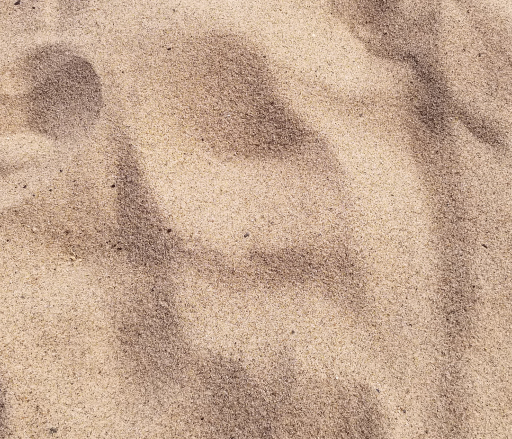
Black sand
Black sand is a trickier substance to work with than simply wet or dry sand. This is because black sand beaches contain both positive and negative mineralisation, so in order to be effective traditional detectors would need to have two opposing forms of ground balance that work simultaneously. There are a number of different detectors that we offer that are excellent for black sand, see further down for our recommendations for kit on the beach. If you’re concerned about metal detecting in black sand, one of our friendly experts would be happy to advise you - get in touch here.
Heavy traffic areas
There are certain areas of the beach that will be busier than others, because they are close to areas of interest. Examples of these places are:
- Tidal pools or rock formations
- Refreshment stands
- Lifeguard towers
Every beach is different, so it’s important to take the time to get to know your local beaches and how busy they are throughout the year.
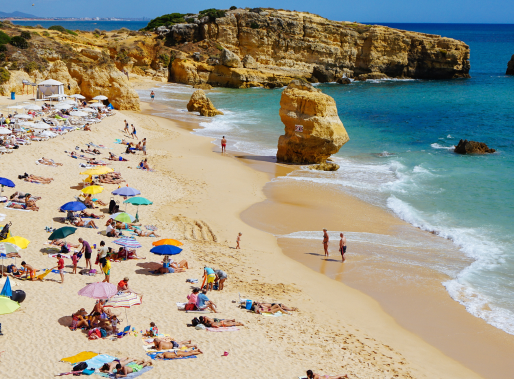
Entrance and exit areas
Take a look at your local beach: it will have popular entrance and exit areas where the majority of visitors will come and go from. This could be at the base of a set of steps, or a pathway through grass out onto the sand. As these are the most heavily trodden areas, it is incredibly likely that people will have dropped items in these areas. Be sure to take good care when checking them.
Entrance and exit areas
Take a look at your local beach: it will have popular entrance and exit areas where the majority of visitors will come and go from. This could be at the base of a set of steps, or a pathway through grass out onto the sand. As these are the most heavily trodden areas, it is incredibly likely that people will have dropped items in these areas. Be sure to take good care when checking them.
Towel line
The towel line describes the line, usually just above the high tide mark where people will lay their towels, bags and other items while sunbathing or swimming in the sea. This makes it an excellent place to look, just be sure to come either early or late in the day if you’re detecting in the high season so as not to disturb the other beach goers.
Tips for metal detecting on the beach
As experts in the metal detecting world will know, not all places are made equal. This means that you need to take into account different considerations before you set off on your next beach metal detecting adventure. The experts at Crawfords have put together some top tips to help you stay safe and hopefully find treasure the next time you visit the beach.
Make sure you have permission
We mentioned right at the beginning of this article that you should always make sure you have the correct permissions. This includes if, for example you wanted to metal detect at beaches while you are on holiday. The metal detectors’ code of conduct states always to obtain permission before you metal detect, so only go ahead if you are 100% sure.
Gridding
Seasoned metal detectorists will be aware of the term ‘gridding’. It is a simple and oft-used technique to ensure you are thoroughly detecting an area and leaving no stone unturned, as it were.
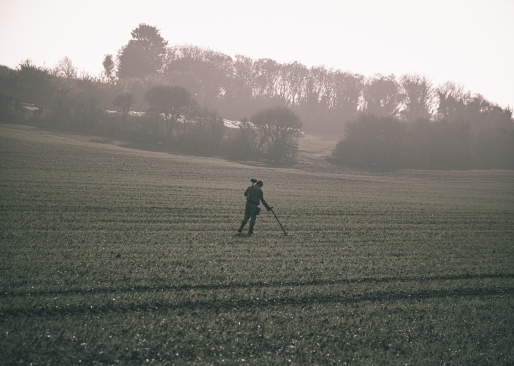
At the beach, the process involves choosing an area of the beach that’s parallel to the water line, and scanning back and forth and up and down within that grid. This is especially easy within beach detecting as you can see where you have walked and spot any areas you have missed. You could also mark out your grid prior to beginning your search by dragging a shovel or spade across the ground.
Choose the right time
If you’re looking to specifically explore wet sand, it’s important to research the tide times before you visit as you will want to be there around low tide. It’s also worth thinking about times of day and year when the beach will be at its least busiest, to allow you the time to thoroughly search the area without worry you will bump into people or not be able to reach all the areas you want to.
Be aware of changes in your surroundings
It is very easy to get sucked in concentrating on the task at hand, especially when you have headphones on and you are looking at the ground.
Whenever and wherever you are when metal detecting, be sure to keep an eye on your surroundings, for your own safety and for the safety of others. At the beach, this means keeping an eye on the tide in case it is coming in faster than you anticipated. It can also mean to look out for sunbathers, dog walkers and other people so that you don’t collide with them. Also watch out for any trip hazards!
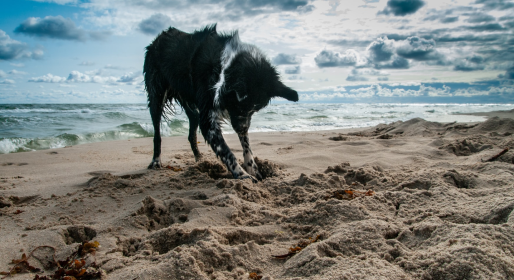
Fill in any holes you make
As a community, we always want to encourage safe and considerate actions when metal detecting. As exciting as it can be to find treasure, be sure to fill in any holes you dig in the sand afterwards. This is to ensure they don’t become a trip hazard for someone who might not have seen you make the hole.
What kit do I need?
If you’re just starting out on your metal detecting journey, you might not know exactly what you should take with you when you want to use your metal detector at the beach. We have put together a list of kit which will help make your next beach trip more enjoyable and hopefully, successful.

A suitable detector
If you’re just starting out, it can be difficult to know which metal detector is best for the beach. If you plan to detect in wet sand or even in the water, you will need a metal detector with a waterproof search-head. The entire detector doesn’t need to be waterproof as long as you keep the control box dry and away from the water. For detecting only on dry sand, a good quality metal detector will serve you well, and we have many excellent options to choose from.
When it comes to detecting metal on wet sand or in water, a special type of detector is required due to the conductive properties of salt minerals in seawater. These minerals cause a phenomenon known as mineralization, which can interfere with a detector’s ability to function effectively on wet sand. Fortunately, advanced technologies have been developed to address this issue.
One such technology is simultaneous multi-frequency detection, as seen in Minelab’s Multi-IQ technology. This method sends and receives signals on various frequencies at the same time, enabling the detector to ‘see’ the ground in greater detail and more accurately identify buried objects. For example, the Minelab Vanquish 340 and the Minelab X-Terra Pro are excellent choices for beach detecting. Both models are equipped to handle the challenges of mineralization, making them ideal for use on wet sand and in shallow water.
Explore the Minelab Vanquish 340 and Minelab X-Terra Pro detectors or browse our full range of beach-suitable metal detectors.
Headphones
Headphones are an essential piece of equipment for a number of reasons:
If you are metal detecting in a busy area, you are not disturbing other people with the noises your detector is making.
They allow you to pick up on the fainter signals that you might miss otherwise.
They also enable you to work in windy or otherwise adverse conditions where you might not be able to hear from the detector itself.
Headphones also help those who may be hard of hearing.
Allow you to focus on the task at hand so you are less likely to miss any potential finds.
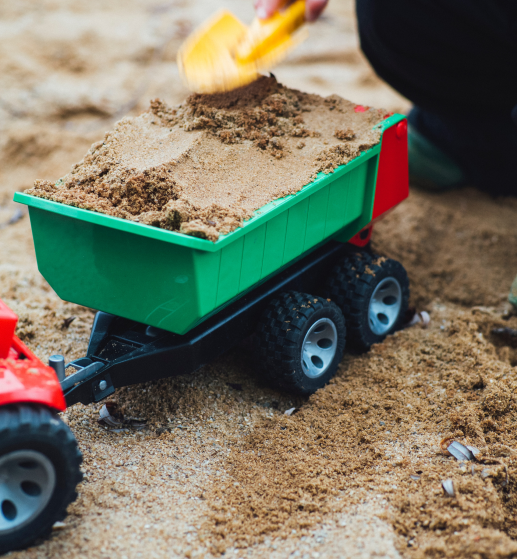
At Crawfords we offer a wide range of excellent headphones with features such as Bluetooth and noise cancellation.
Scoop
Sand scoops are essential pieces of equipment for those looking to regularly metal detect on beaches. Made from either plastic or metal, these long-handled scoops allow you to scoop out the sand at a target site and effectively filter out the sand, leaving any found objects behind.
There are different types of scoops depending on whether you’re digging into dry or wet sand. Having a scoop allows you to save both time and energy, allowing you to spend more time scouring the sand and hopefully finding more buried treasure.
Shovel
If you are looking to detect at stony or rocky beaches rather than sandy beaches, it may well be worth taking a shovel along with you. It works on the same premise as a scoop, but it is much easier to move bulky rocks and stones with a shovel.
Be aware of changes in your surroundings
It is very easy to get sucked in concentrating on the task at hand, especially when you have headphones on and you are looking at the ground.
Whenever and wherever you are when metal detecting, be sure to keep an eye on your surroundings, for your own safety and for the safety of others. At the beach, this means keeping an eye on the tide in case it is coming in faster than you anticipated. It can also mean to look out for sunbathers, dog walkers and other people so that you don’t collide with them. Also watch out for any trip hazards!

Pinpointer
Newer metal detectorists may not have heard of the pinpointer tool: but you will be glad you did. A pinpointer is a fantastic piece of equipment that enables you to exactly locate the hidden treasure after you have discovered its general location with your metal detector. Pinpointers come in two different types. A standard pinpointer is a handheld device, and at its point it contains a miniature detector coil. Due to the shape of the pinpointer, you can insert it into the ground into the hole you have dug. This allows you to exactly locate where the metal is in the specific area. Check out our range of Pin-pointers here.Â
The other type of pinpointer is built in, a feature that many modern metal detectors have. It works as a separate ‘mode’ on your detector, allowing you to switch between. Both of these types of pinpointer are excellent at saving you precious time and energy digging and searching. Take a look at the pinpointers we offer.
Your phone
At Crawfords we always want to encourage safe and responsible metal detecting. That means as well as looking after the environment, we also want you to look after yourself. If you are metal detecting alone, make sure you have with you a fully charged phone so that you can contact someone in case of emergency. Let them know where you are going and how long you plan to stay. This means that if there is an accident, a change in the weather or some other unforeseen circumstance, you will have the security of knowing that someone is looking out for you.

For areas where there isn’t any phone signal, try taking a two way radio or similar. Alternatively, you can go with someone else or a number of other people so that you can look out for each other.
Bin bag
At Crawfords we feel it is important to look after the environment. Unfortunately, when you are trawling your local beaches you are likely to come across litter, anything from cans and bottles to plastic bags. If you take a bin bag with you to pick up litter as you go, you are helping to look after the environment that we all share.
Notebook
We recommend having a dedicated metal detecting notebook that you take with you wherever you go.
- Log what you found and where you found it
- Times and locations
- Compare notes with detectorist friends
You can use whatever kind of book you choose; a plain notebook is perfectly fine but many people choose to use detecting log books which are divided into sections for dates, times and other details.
Can I use my metal detector in water?
It is understandable that many people will wonder if metal detectors can get wet, or if the water disrupts the technology. As we mentioned before, it is possible with the right technology to use metal detectors on wet sand, but are you able to completely submerge them? And would they stop working in a heavy downpour?
You will be glad to know that there is technology that allows for certain metal detectors to be used both in heavy rain and to immerse in water. Take a look at our selection of waterproof metal detectors here.
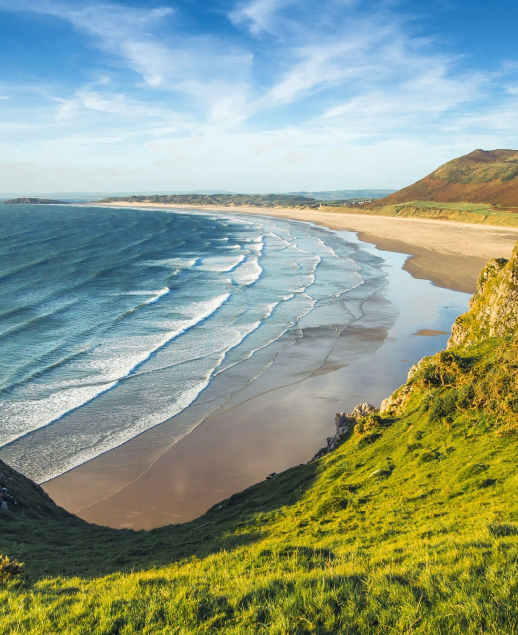
Dry sand
Every beach will have areas of sand where the waterline doesn’t reach. This is ideal if you have a metal detector which isn’t waterproof, as it will be able to locate any potential treasure without the challenges that wet sand and water brings.
Wet sand
As we’ve touched on before, working with wet sand comes with its own set of challenges. There are a number of things to think about before you get started.
The right detector: If you’re looking to fully submerge your metal detector in water you will need to ensure it is waterproof. Take a look at our waterproof metal detector range here.
Water scoop: A water scoop differs from a traditional sand scoop in a variety of ways. Firstly, it has a longer handle to allow for more reach. It also has a pointed front which makes it easier to dig through potentially rocky sand on the seabed.
Wait for low tide: This is when you will be able to access the largest portion of wet sand at the beach. Low tide also reveals scallops in the sand where items may naturally collect, so this is a great place to start.
What happens if I find treasure?
First of all, this depends on the exact type of treasure you have found and where you found it. To be clear, this is all information regarding the laws and regulations in the UK. If you are thinking of metal detecting while you are on holiday, we advise you to check before you travel.
The Treasure Act
In England, Wales and Northern Ireland, something called the Treasure Act applies in this situation. According to the Treasure Act (1996), anything that might be considered ‘treasure’ must be reported to the local Coroner or Portable Antiquities Scheme (PAS) Finds Liaison Officer (FLO) within 14 days. The Act defines treasure as:
- Gold or silver items
- Groups of coins
- Items that look to be more than 300 years old
- Items found in the same place as other recorded treasure
- Items of a prehistoric date or made from precious metal

Treasure Trove Scotland
The laws on metal detecting in Scotland differ from the rest of the UK. If you think you may have found something of archaeological importance on Scottish land, you are obliged by law to report it to the Treasure Trove Unit. Natural artefacts, for example animal bones or fossils, do not need to be reported.
Receiver of Wreck
The Receiver of Wreck is a British Government official who administers the law relating to recovered wreck material. It is a legal requirement in the UK to report all recovered wreck, and the Receiver of Wreck will investigate to find out the owner.
Wreck can be defined as:
Flotsam: goods lost from a ship that are recoverable because they have floated
Jetsam: goods thrown overboard in order to lighten the load of a vessel that may be in danger of sinking
Derelict: property that has been abandoned at sea by those in charge of it. This can include vessels and cargo.
Lagan: goods that have been cast overboard and buoyed so that they can be recovered later on.
What happens if I find something that might be dangerous or suspicious?
It occasionally happens that you will find something you suspect could be dangerous. This could be anything from a hand weapon such as a knife or a gun, or a relic from war such as a bomb or ammunition. In this case, it is vital that you report it to the relevant authorities, such as the Coastguard and do not try to touch or remove the item yourself. They will then be able to deal with it appropriately.